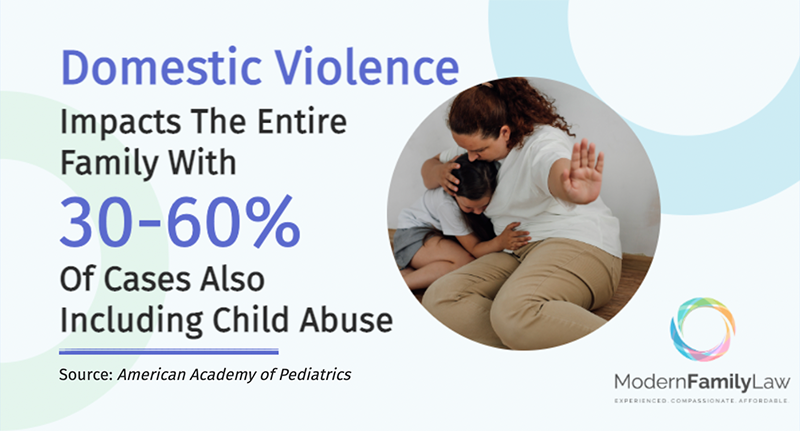DOMESTIC VIOLENCE ATTORNEYS
IN COLORADO
Domestic violence is a serious issue that affects millions of individuals and families across the United States. Colorado is no exception, and in recent years, the state has taken significant steps to address and prevent domestic violence. However, despite these efforts, domestic violence remains a pervasive problem in Colorado.
For victims of domestic violence, seeking legal assistance from a domestic violence lawyer can be crucial to protecting their safety and legal rights. Our attorneys have the knowledge and experience to help individuals file and navigate domestic violence in Colorado. They work diligently to ensure that their client's rights are protected. Learn about domestic violence in Colorado below including:

With a deep understanding of the intricate nature of family law, our skilled domestic violence attorneys in Colorado possess extensive expertise in handling cases of this nature, supporting clients throughout every stage of the legal process, from filing essential documentation to representation in court, with the aim of achieving the most favorable outcome possible and upholding justice.
WHAT IS DOMESTIC VIOLENCE
IN COLORADO?
Colorado has comprehensive domestic violence laws aimed at protecting victims and punishing offenders. Domestic violence refers to physical, emotional, or psychological harm inflicted on a person by a current or former intimate partner or family member. Domestic violence cases are taken very seriously in Colorado, and law enforcement agencies have a zero-tolerance policy towards such offenses.
Under Colorado law, domestic violence is defined as an act or threatened act of violence upon a person with whom the offender is or has been involved in an intimate relationship. An intimate relationship can include spouses, former spouses, people who have been in a romantic relationship, people who have lived together, or have a child in common.
Colorado has several domestic violence offenses, including but not limited to:
1. Domestic Violence Assault: This offense occurs when a person knowingly or recklessly causes bodily injury to their intimate partner or family member.
2. Domestic Violence Harassment: This offense involves an intent to harass, annoy, or alarm another person, including physical or emotional harm, threats, or obscene language.
3. Domestic Violence Stalking: This offense involves repeatedly following, contacting, or harassing another person, causing them to feel threatened, intimidated, or terrorized.

4. Domestic Violence Menacing: This offense occurs when a person knowingly places or attempts to place another person in fear of imminent serious bodily injury.
5. Domestic Violence Criminal Mischief: This offense involves destroying or damaging the property of an intimate partner or family member.
6. Domestic Violence False Imprisonment: This offense occurs when a person knowingly restricts the movement of another person without their consent.
These are just a few examples of domestic violence offenses in Colorado. The consequences for a domestic violence conviction can be severe, including fines, probation, and even imprisonment. It is important to seek legal counsel if you or someone you know has been charged with domestic violence.
HOW DOES DOMESTIC VIOLENCE IMPACT
FAMILY LAW CASES IN COLORADO?
Domestic violence has a significant impact on family law cases in Colorado. Victims of domestic violence often face legal challenges in areas such as divorce, child custody, and support, and property division. The presence of domestic violence in these cases can complicate matters and add additional layers of complexity to already stressful situations.
Fortunately, victims of domestic violence have legal remedies available to them under Colorado family law. These remedies include protection orders, which can require the abuser to stay away from the victim and their children, as well as child custody and support orders that take into account the impact of domestic violence on the family.
The court plays a crucial role in addressing domestic violence in family law cases. Judges are required to consider evidence of domestic violence when making decisions related to custody and parenting time and to take steps to ensure the safety of victims and their children. In some cases, the court may order the abuser to attend counseling or take other steps to address their behavior.

Overall, it is important for victims of domestic violence in family law cases to have the support of an experienced domestic violence lawyer who can help them navigate the legal system and protect their legal rights and safety.
WHAT ARE PROTECTIVE ORDERS
IN COLORADO?
Protective orders are a legal remedy available to victims of domestic violence in Colorado. These orders are designed to protect victims and their children from abuse and harassment by the abuser.
To obtain a protective order in Colorado, a victim must file a petition with the court. The petition must include detailed information about the abuse, including the specific acts of violence or threats, and the victim's relationship with the abuser. The victim may also need to provide evidence, such as witness statements, medical records, or police reports, to support their claim.
There are several types of protective orders available in Colorado. The most common type is a restraining order, which prohibits the abuser from contacting the victim or coming near them or their children. Other types of protective orders include:
Emergency Protection Orders (EPOs): These are temporary orders that can be issued by law enforcement officers in emergency situations, such as when the victim is in immediate danger.
Permanent Protection Orders (PPOs): These are longer-term orders that can be issued by a judge after a hearing. PPOs can provide more extensive protections, such as ordering the abuser to stay away from the victim's home, workplace, or school.
Civil Protection Orders (CPOs): These are protective orders that can be issued in non-domestic violence cases, such as cases involving harassment or stalking.
Overall, protective orders are an important legal remedy for victims of domestic violence in Colorado. If you or someone you know is experiencing domestic violence, it is important to seek the assistance of a qualified domestic violence lawyer to help you navigate the legal system and obtain the protection you need.
WHAT OUR CLIENTS SAY ABOUT OUR
EXPERIENCED FAMILY LAWYERS IN COLORADO
FREQUENTLY ASKED QUESTIONS ABOUT
DOMESTIC VIOLENCE IN COLORADO
How Does Domestic Violence Affect Child Custody And Visitation?
Domestic violence can have a significant impact on child custody and visitation in Colorado. In cases where one parent has been the victim of domestic violence by the other parent, the court will consider the impact of the abuse on the child and may take steps to protect the child’s safety and well-being.
Under Colorado law, the court is required to consider evidence of domestic violence when making decisions about child custody and visitation. The court will examine the specific circumstances of the abuse, including the severity, frequency, and nature of the abuse, as well as the impact of the abuse on the child’s physical and emotional well-being.
If the court finds that domestic violence has occurred, it may take a number of steps to protect the child, such as ordering supervised visitation, requiring the abusive parent to attend counseling, or limiting the abusive parent’s access to the child. In some cases, the court may even deny the abusive parent any visitation or custody rights.
It is important to note that a finding of domestic violence does not automatically mean that the abusive parent will lose custody or visitation rights. The court will consider a variety of factors when making these decisions, including the child’s best interests, the parenting abilities of each parent, and the child’s relationship with each parent.
What Happens If I Violate A Protective Order In Colorado?
Violating a protective order in Colorado can result in serious consequences. A protective order is a legal document that is issued by a court to protect someone who has been a victim of domestic violence or stalking. Violating a protective order means that you have failed to comply with the terms of the order, which can include staying away from the victim, refraining from contacting the victim, or other restrictions.
If you violate a protective order in Colorado, you can be charged with a misdemeanor or a felony, depending on the circumstances of the violation. If you are convicted, you can face jail time, fines, or other penalties.
In addition to criminal charges, violating a protective order can also impact other legal proceedings, such as child custody or visitation hearings. The court may consider the violation as evidence of your inability to follow court orders or your lack of respect for the safety of the victim and the legal system.
It is important to take a protective order seriously and to comply with all of its terms. If you have been accused of violating a protective order, it is important to seek the guidance of a qualified domestic violence lawyer who can help you understand your legal rights and options and can work to protect your interests in court.
How Long Does A Protective Order Last In Colorado?
The length of a protective order in Colorado depends on the specific circumstances of the case. Generally, a protective order can last for up to one year, but the court may extend the order for a longer period of time if necessary to protect the victim.
In cases where the victim is in immediate danger of harm, the court can issue an emergency protective order that is effective immediately and lasts for up to 72 hours. After the emergency protective order expires, the victim can request a temporary restraining order, which can last for up to 14 days. If the victim needs protection beyond the 14-day period, the court can issue a permanent protective order for up to one year.
It is important to note that a protective order can be modified or terminated by the court if the circumstances of the case change. For example, if the victim and the abuser reconcile or the abuser demonstrates that they are no longer a threat to the victim, the court may modify or terminate the protective order.
If you have been the victim of domestic violence and need protection, it is important to seek the assistance of a qualified domestic violence lawyer who can help you obtain a protective order and take steps to ensure your safety.
OUR COLORADO FAMILY LAW OFFICE LOCATIONS
OUR COLORADO FAMILY LAWYERS
ARE READY TO LISTEN!
Don't suffer in silence. Domestic violence is a
serious issue that requires legal expertise and support.
Contact our domestic violence lawyers today to learn more about your legal options.
Schedule A FREE
Consultation
